|
|
|
|
|
|
|
|

|
Digitising Patterns of Power
Newsletter No.4 / December 2016
|
Dear Ladies and Gentlemen,
Dear Colleagues,
The second year of our project DPP is coming to a fruitful completion, and we are very much looking forward to the third year (2017) of our project, which will bring new scholarly insights as well as innovative software features and mapping tools. At the same time we would like to express our sincere gratitude to our friends and colleagues, who have supported us with their remarks and thoughts in the wake of our DPP Workshop at the Austrian Academy of Sciences in September 2016. This very fact has helped us to shape our ideas on the “Sign of Power” in our DPP Database, which again is of crucial importance for the two following years of our project.
In 2017 we plan to continue with our broad scholarly activities in order to contribute constructively and sustainably to the fields of Medieval History, Archaeology, (Historical) Geography and Digital Humanities.
We wish you a very Merry Christmas and a Happy New Year 2017!
Yours sincerely,
the DPP team
|
|
|
|
|
|
|
|
DPP's First International Workshop
in Vienna
|

|
The First International Workshop entitled "Digitising Patterns of Power (DPP): Theory and Practice in Historical Geography and Digital Humanities" took place on 28/29 September 2016 at the Institute for Medieval Research (IMAFO) of the Austrian Academy of Sciences (Österreichische Akademie der Wissenschaften, ÖAW) in Vienna. It was organised by the DPP team. In total 25 national and international researchers, representing manifold academic disciplines, talked about relevant aspects, expectations and possibilities of digital methods in History, Archaeology and Geography, especially databases, digital editions and mapping.
In the first session of the Workshop the DPP team introduced their scholarly work to the participants. The second session was dedicated to the concept of Signs/Symbols of Power in DPP, while the third session focused on digital mapping and edition. On the second day the fourth session tried to evaluate the usefulness of environmental data for the project, and in the fifth session Professor Johannes Koder (ÖAW) and his respondent Professor Charlotte Roueché (King's College London) talked about the sources and their digitalisation in Byzantine Studies.
|

|
|
On two evenings three public lectures also took place, the subject matter of which were "Digital Mapping for Antiquity" by Professor Richard J.A. Talbert (University of North Carolina), "Environment as 'Total Phenomenon' of History?" by Professor Verena Winiwarter (University of Klagenfurt) and "50 Jahre Tabula Imperii Byzantini an der ÖAW" by Professor Andreas Külzer (ÖAW). All three public lectures were well attended by students of the University of Vienna.
The envisaged goal of the Workshop has been totally achieved, which was to establish a theoretical basis for the common research question of DPP, namely the definition of “Signs of Power” for all case studies and their representation as Dynamic Types within the framework of the DPP-Database. The organisers enjoyed the Workshop and are very grateful to all lecturers, chairs and participants for the fertile discussions and the useful remarks.
|
|
|
|
|
|
|
|
Outlook
DPP at the IMC Leeds, 3-6 July 2017
|

|
In summer 2017 we will attend again the International Medieval Congress (IMC) in Leeds. Last year was a huge success for the project DPP due to the fact of a deeply interested audience, which facilitated the exchange of ideas. In 2017 the DPP team will present altogether eight papers in two sessions. The first session is entitled "Genealogy on a Map". Veronika Polloczek will present her MA thesis on "Memoria and Self-Representation on the Example of Hans III Herzheimer". Bernhard Koschicek will show, based on the data of Polloczek’s thesis, how genealogical data can be represented in the OpenAtlas Standalone Software. Markus Breier will talk about "Cartographic Aspects – Interactive Mapping of History and Cartographic Principles" and Rainer Simon about "Using Recogito for Annotation and Mapping of Historical Sources".
The second session will begin with David Schmid speaking on "Change of Sovereignty in Justinian Ravenna in the 540s", followed by Mihailo Popovic and the presentation entitled "Byzantium and the Others – The Change of Elites in Byzantine Macedonia in the Wake of the Serbian Expansion in the 14th Cent." Stefan Eichert will discuss the topic "Digital Collection, Evaluation and Presentation of Archeological Data, Interpretations and Results" with the focus on his DPP case study on the early medieval Morava/Thaya border region. Last but not least our software engineer Alexander Watzinger will talk about "Relational Modelling of Historical Data: Concepts and Challenges". As soon as the timetables and the venues of our sessions at the IMC 2017 have been fixed, we will inform you in more detail.
|
|
|
|
|
|
|
|

|
Prototype of Map-Based DPP Application
|
The DPP members at the University of Vienna, Department for Geography and Regional Research are currently working on the first prototype of the map based online application, which will be the prominent frontend of the DPP project. This application, which is a key aspect of the project, will serve two equally important functions. One function is to enable the scholars of DPP to view the spatial data and explore spatial relations between different database entities and thus gain insight to the medieval landscape.
The second function of the application is to present the research of DPP and its results to an interested public audience. In the final application key results of DPP will be communicated via “story maps”, predefined views of the data which are complemented with a detailed description of the topic shown and information about its significance for the historiography.
The prototype offers basic functionality, queries as well as dot representations of the data. It is a testbed for various representations of uncertain geometries to determine which one is best suited for the final application. Step by step, more advanced functions and queries will be implemented and tested in the prototype.
|
|
|
|
|
|
|
|
|
|